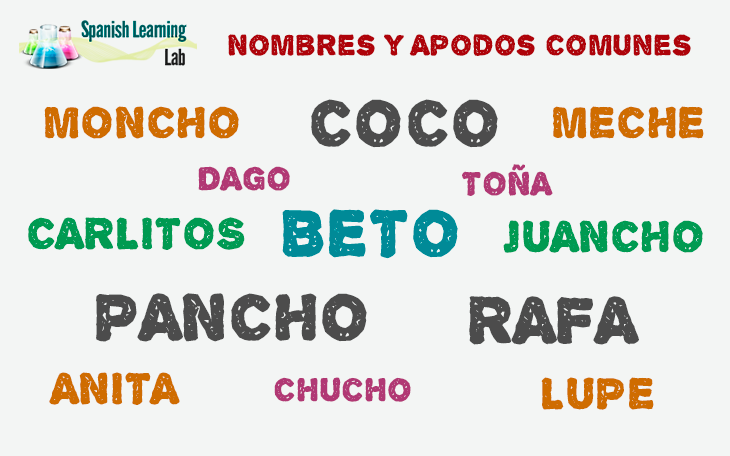¡Hola! Thanks for joining us in this basic lesson. Today, we will learn some very common nicknames in Spanish and use this new vocabulary in two listening activities. You will listen to people introducing themselves in Spanish and also talking about their nicknames and where they come from. Let’s start…
Vocabulary Introduction: A list of common nicknames in Spanish
First of all, nicknames are really common in Latin America. They are normally used as a way to refer to friends and family members in a more affectionate or casual way. Just like English nicknames, nicknames in Spanish are oftentimes very similar to the original name and sometimes they differ a lot. Take a look at the picture below and guess the real names of some of these people based on their nicknames.

Some nicknames in Spanish are born out of a physical feature. For instance, the word “Pelón” (bald) is used as a kind way to call newborns, but sometimes it becomes a permanent nickname for guys. Those nicknames related to physical appearance are really interesting, but they could sound disrespectful at times. In this lesson, we will focus on nicknames that are born from names. Here is a list of names with their corresponding nicknames in Spanish.
|
Beto – Alberto, Adalberto, Humberto, Roberto, Rigoberto, etc.
|
|
Cata – Catalina
|
|
Coco – Socorro
|
|
Concho(a) – Concepción
|
|
Chayo – Rosario
|
|
Chema – José María
|
|
Chente – Vicente
|
|
Dagoberto – Dago
|
|
Goyo – Gregorio
|
|
Juancho – Juan José
|
|
Lupe – Guadalupe
|
|
Magda – Magdalena
|
|
Meche – Mercedes
|
|
Moncho – Ramón
|
|
Mundo – Edmundo, Raimundo, etc.
|
|
Nacho – Ignacio
|
|
Poncho – Alfonso
|
|
Rafa – Rafael
|
|
Toña – Antonia
|
|
Tere – Teresa
|
There is one more category of nicknames in Spanish that is extremely common. It consists of words ending in the suffix “-ITO/A”, for example: “Manuel” and “Manuelito”, “Jaime” and “Jaimito” or “Rosa” and “Rosita”. You can do this with most names in the language, except for long names as it may sound awkward. When the name ends in the vowel “E”, we must substitute the last “E” for “I”.
Listening Activity No. 1: Friends and nicknames in Spanish
Key expressions in the conversation:
- “Me he perdido” means “I haven’t been around for a while!”
- “Le mando saludos” means “I send him greetings!”
Listening Activity No. 2: Spanish nicknames at work
Key expressions in the conversation:
- “Entrar en confianza” means “Gain confidence!”
- “Llamarlos por su nombre” means “Call them by their names”
- “De cariño le decimos” means “We kindly call her/him…”
This is all for this lesson. We hope you found it useful. We will cover more nicknames in Spanish in future lessons. Leave us a comment if you have any suggestion and tell us how well you did in the listening quizzes. ¡Hasta pronto!